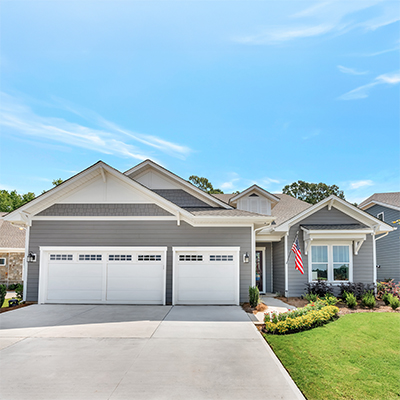Reverse Mortgage Might Be in Your Future
Category: Financial and taxes in retirement
This is the second of a multi-part article on retirement confidence and the ability of retirees to have a comfortable retirement. The first article was called “Retirement Confidence Hits Rock Bottom“.
A new study from the Boston College Center for Retirement Research shows that 6 out of 10 retirees (61%) are at risk of not having enough retirement income to maintain their pre-retirement living standard. Those who choose to use a reverse mortgage to increase their retirement income can reduce their risk to 51%. For many reasons, however, only about 2% of retirees choose to take out a reverse mortage.
While the findings of the Boston College Center for Retirement Research highlight the financial challenges many retirees face, it’s essential to consider the various options available to enhance retirement income. One of these options is refinancing a mortgage, which can significantly reduce monthly payments and free up additional funds for living expenses. Homeowners looking to explore this avenue can utilize tools like ez’s mortgage refinance estimator, which allows them to assess potential savings and determine if refinancing aligns with their financial goals.
In addition to refinancing, retirees can consider other strategies to make the most of their home equity. Selling a home and downsizing or relocating to a more affordable area can provide a substantial cash influx, while also reducing ongoing maintenance and living costs. By combining these strategies with careful planning and resources like mortgage refinance estimator, retirees can better navigate their financial landscape, ensuring they maintain a comfortable standard of living throughout their retirement years.
Boston College’s National Retirement Risk Index (NRRI) And the House measured the share of American households ‘at risk’ of being unable to maintain their pre-retirement standard of living in retirement. The Index is calculated by comparing households’ projected replacement rates – retirement income as a percent of pre-retirement income – with rates that would allow them to maintain their living standard. Housing accounts for two-thirds of the net worth of the least well off third of the population and about one-third of the wealthiest third. However when the discounted value of social security and defined benefits are factored into net worth, the home is worth less than 20% of all income groups, a perfect illustration of just how valuable an asset social security is to retirees. Even at less than 20% of net worth, however, the home still has the potential to be a powerful financial asset.
The vast majority (98% of those eligible) of retirees pass on their homes to their heirs, instead of taking the money out in the form of a reverse mortgage. However, the experts at Boston College find that retirees will have a much better chance of maintaining their pre-retirement living standard if they were to use a reverse mortgage. Retirees without a reverse mortgage in all income groups combined have a 61% chance of not maintaining that standard, but when they use a reverse mortgage that risk drops to a better, if not completely rosy, 51%. Not surprisingly, the lowest third economic group is at greatest risk of a reduced living standard (69% without and 60% with a reverse mortgage), while the wealthiest third’s risk index declines from 52% to 42% with a reverse mortgage.
The implications of the study are clear. Given the abysmally low savings rates we covered in part 1 of this series, the vast majority of retirees are going to have to pull out all the stops to enjoy a comfortable retirement. One of the biggest weapons in their arsenals is the reverse mortgage, so it is essential that everyone understand how these work.
What is a Reverse Mortgage?
In general a reverse mortgage lets you use your home as a big piggy bank. The loan gives you access to a portion of the eventual proceeds of your home, while you get the right to continue to live in the home. The loan doesn’t have to be repaid until you die or move out of your home. Just how much you can take out depends on the interest rate you pay on that money along with your age. One rule of thumb is that you can usually take out about half of the value of your home at age 65. Once in place you can opt to receive that portion of the value of your home as either a lump sum payout you can then invest into an annuity, or through regular payments from the mortgage holder. This income can be used for your expenses and to help maintain your current lifestyle. The FHA even has a reverse mortgage program that many people can take advantage of.
There are some downsides to reverse mortgages. If you live long enough the value of the home you leave to your children will be small. A very basic but important question is, is it a good idea for you to continuing to live where you do now? If your home is in the suburbs far from shopping, doctors, pharmacy, and relatives – maybe not. You might be better off cashing out your home by selling it and either buying into a Continuing Care Retirement Community, or renting in a 55+ community that has the capability of extending additional care as you age.
More Resources
FHA Reverse Mortgage Program – Top 10 Things You Should Know about a Reverse Mortgage
Free Booklet from National Council on Aging – “Use Your Home to Stay at Home“
Next Time
In the 3rd part of this series we will cover strategies to help you maintain a comfortable lifestyle in retirement. In the meantime, if you have comments or suggestions please use the Comments section below.






Comments on "Reverse Mortgage Might Be in Your Future"
Lynda Menis says:
I will be 65 Nov.30, the day my husband will be 59 1/2 and is retiring from Raytheon. I applied for a reverse mortgage from AAG in California. We had the appraisal done ($400) and the telephone counseling call ($75) as well. Then we were told we were being denied, because the appraisal came in too low. Thankfully, our "eggs are in order" according to the financial advisor at our credit union, and I had budgeted the mortgage into my husband's pension and my social security check. We are fine for now. However, I feel suckered by AAG. Any suggestions on whether we should apply again somewhere else?
al says:
do not push reverse mortgages. They are perhaps the WORST thing one can do unless you have less than a year to live..........No gift in retirement!!!!!!
Admin says:
Excellent article about reverse mortgages including pros and cons as well as some important concessions that lenders have recently started offering in the New York Times. Definitely worth reading! " Reverse Mortgages, Still Costly, But Less So" http://www.nytimes.com/2010/04/17/your-money/mortgages/17money.html